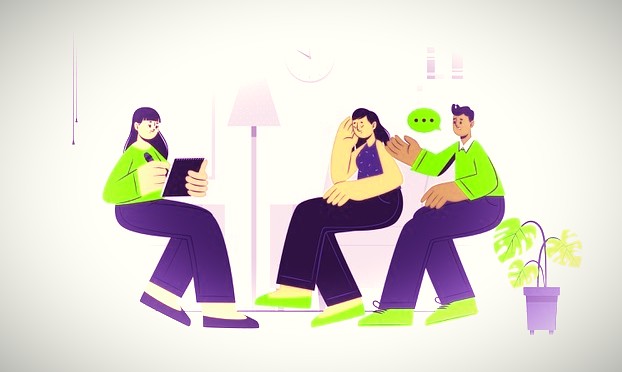Here’s the straight talk: about 70% of couples who engage in therapy report clear improvements in their relationship and individual wellbeing; nearly 99% say it had a positive impact.
If you’re reading this, you’re already sensing something’s off — that’s good. Awareness is the awakening.
The truth is, relationships today are under immense pressure considering the relentless pace of modern life.
Let’s explore the seven major signs you need relationship counselling — with raw honesty, relatable examples, and practical insight.
The Telltale Signs
Here are the major red-flags, the “wake-up your senses” signals. Think of this as your relationship litmus test. If several of these apply, you’re well within the territory of when to seek couples therapy.
And yes, you might even show a few alone. That’s fine. Recognising the signs you need relationship counselling is the first step.
1. Communication is a Haunted House
You used to talk. Now you wait for silences with dread. Conversations feel like ticking bombs or hollow rituals.
Example: Your partner says “I’m fine,” but you know they’re not. Asking only leads to tension, so you stop asking.
Why it matters: Communication is the frame of every relationship; when it collapses, everything else follows.
Counselling benefit: A therapist helps reopen dialogue and teach emotional safety.
2. Emotional Distance / Disconnection
It’s not just about fights; it’s about feeling nothing. You drift like strangers, lonelier together than apart.
Example: You scroll in bed side-by-side, watch separate shows, avoid intimacy, and settle for small talk.
Fact check: Around 90% of people believe their relationship and mental health are closely linked.
Counselling benefit: Therapy helps rebuild emotional presence and reconnect you with empathy.
3. Recurring Patterns You Can’t Break
You keep looping through the same arguments or betrayals. You’ve said “not again” more times than you’d like.
Example: Money gets tight, blame begins, and the old dynamics repeat.
Counselling benefit: A therapist helps identify root causes — generational trauma, addiction, shame — and guides you in shifting the system.
4. One Partner Is Doing All (or Most) of the Work
Unequal load? One is emotionally available, the other checked out. One wants connection, the other wants escape.
Example: You keep showing up, making plans, trying to heal, while your partner says “I’ll join you later”, and “later” never comes.
Counselling benefit: Therapy invites both parties, surfaces hidden resistances, ensures the work doesn’t rest on just one person’s back.
5. Life Transitions or Trauma Are Hitting You – Hard
Addiction, identity issues, mental-health struggles, major life shifts (move, job change, illness, children), generational trauma: these are all contexts in which relationship stress escalates.
Example: One partner gets sober and the other hasn’t adjusted; or identity revelations (gender, sexuality, past trauma) surface and the “old contract” in the relationship no longer fits.
Counselling benefit: Therapy provides a safe container to navigate transitions together — and individually.
6. Boundaries Are Blurry or Non-existent
Healthy relationships need clear boundaries. Without them, the system feels chaotic or codependent.
Example: You over-apologize for things that aren’t wrong; you tolerate disrespect because you fear loss.
Why it matters: Without boundaries, respect erodes and resentment grows.
Counselling benefit: Therapy helps you set and sustain firm, kind limits that restore balance.
7. You’re Exhausted But Hope-less
You feel drained, resentful, or indifferent. The spark is gone and so is your hope for change.
Statistic: Most couples wait years before seeking help; noticing fatigue now means you’re already ahead.
Counselling benefit: Therapy reignites hope — not just for the relationship, but for personal healing and emotional renewal.
What to Do Next (Action Plan)?
Now for the no-fluff, corporate-jargon-friendly “next steps” you can implement right away.
Step 1: Pause & Inventory
Set aside 30 minutes this week. Grab a notebook or digital doc. Reflect on each of the 10 signs above. Which apply? Rate them on a scale of 1-5. What’s your gut telling you? What partner behaviour, what secret thought, what sleepless moment? Write it.
Step 2: Open the Conversation
Yes, sounds risky. But, be honest. Choose a neutral moment (not during a fight). Say: “I’ve been thinking about us… and I feel (tired/distant/conflicted). I’d like to see someone who helps us make sense of this.” Using “I feel” rather than “You do” keeps it less accusatory.
Step 3: Find the Right Therapist
Look for someone affirming, trauma-informed, and skilled in relationship therapy. Ask: “How do you work with couples? How do you handle resistance? What does success look like?”
Step 4: Commit to the Process
Therapy is not a quick fix; it’s a practice. Be consistent. Track emotional progress rather than perfection.
Block sessions, prep between sessions, keep the notes, track how you feel month-to-month.
Step 5: Measure Progress, Not Perfection
Set realistic markers: fewer heated fights, more honest check-ins, more “we” language instead of “me vs you”. Celebrate micro-wins. Because change isn’t instant, but directionally, yes — you’ll feel shifts.
Why Some Couples Delay — and Why That’s Bad
Tradition often tells us to “handle problems privately” or “never air dirty laundry.” Yet silence costs more than it saves. When to seek couples therapy shouldn’t always remain a question mark because common blockers usually include:
- Stigma: 32% fear judgment.
- Cost or time: Therapy seems inconvenient or pricey.
- Denial: “It’s not that bad.”
- Misconception: Thinking therapy means you’re breaking up, not growing.
Delaying only deepens the cracks. Patterns harden, boundaries blur, wounds widen. What’s a small issue today can become tomorrow’s crisis.
Love isn’t always easy. Relationships aren’t always perfect. That’s okay. What isn’t okay is seeing the signs and doing nothing.
Identifying the signs you need relationship counselling isn’t a sign of failure; it’s a declaration of hope. It’s what people do when they want more: more connection, understanding, and alignment between their inner world and shared life.
If you recognise yourself here, this is your turning point.
Here’s to doing the work; here’s to healing; here’s to the us that’s stronger than the me.

